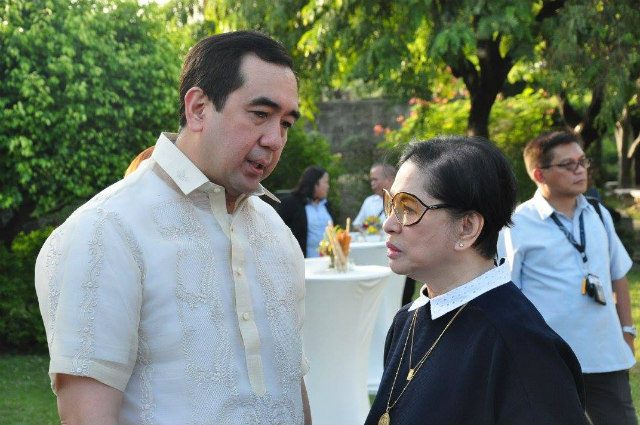SUMMARY
This is AI generated summarization, which may have errors. For context, always refer to the full article.

MANILA, Philippines – Saying this can rob voters of the right to vote, an election watchdog joined calls for the Commission on Elections (Comelec) to junk its rule allowing voters to get replacement ballots.
The Parish Pastoral Council for Responsible Voting (PPCRV) has written the Comelec “asking for clarification” on the contentious ballot replacement rule, PPCRV chairperson Henrietta de Villa said.
Under its amended rules, the Comelec allows voters to get replacement ballots if, through no fault of their own, vote-counting machines (VCMs) reject their original ballots. (READ: The problem with Comelec’s idea of replacement ballots)
“We’re not in favor of that,” De Villa said.
De Villa said the PPCRV also opposes the new Comelec rule that says filing “frivolous objections” over voting receipts is an election offense.
The Comelec itself remains divided on these two rules, and is set to tackle these in its regular meeting on Tuesday, April 26.
Comelec Commissioners Christian Lim and Sheriff Abas have rejected the ballot replacement rule pushed by Comelec Chairman Andres Bautista.
Lim and Abas have also criticized the rule on frivolous objections as baseless under the law.
The rules on replacement ballots and frivolous objections have been included in the Comelec’s amended general instructions for teachers serving as election inspectors.
The Comelec published these amended general instructions on April 12.
Poll chief defends rule
Explaining the rule on replacement ballots, Bautista said he was thinking of the welfare of voters whose ballots get rejected through no fault of their own.
“Kung ikaw ‘yung botanteng ‘yon, how would you feel? Hindi ka ba masasaktan? Hindi ka ba mafu-frustrate? Eto ka pumila ka nang tatlong oras, gusto mong bumoto, gusto mong ihayag ang iyong choices, tapos hindi ka makaboto dahil hindi mo naman kasalanan,” Bautista said.
(If you were that voter, how would you feel? Wouldn’t you feel hurt? Wouldn’t you be frustrated? You lined up for 3 hours, you wanted to vote, you wanted to express your choices, but you cannot vote through no fault of your own.)
The other rule opposed by the PPCRV, the rule on frivolous objections, means voters can go to jail if they file frivolous objections over the way VCMs read their ballots as indicated in voting receipts. (READ: Can Comelec sue voters over ‘frivolous’ objections?)
De Villa, however, questioned the premise that replacement ballots will be available because the voter turnout in polling precincts is rarely 100%.
“But just in case magkaroon, o kaya ang turnout ay 90% pero more than 90% ang balota na nakuha for replacement, papa’no? Saan kukuha ng balota para doon sa mga nakalistang botante doon? That’s disenfranchisement,” De Villa said in an interview with reporters Saturday, April 23.
(But just in case there would be, or the turnout is 90% but the ballots for replacement are more than 90%, what happens? Where will the other voters get the ballots? That’s disenfranchisement.)
The PPCRV chairperson also said the Comelec lacks clear guidelines on issuing replacement ballots.
She cited the broad instruction that boards of election inspectors (BEIs), composed of public school teachers, can issue replacement ballots if it’s not the voters’ fault that the VCMs rejected their original ballots.
De Villa said: “Sino ang magde-decide non? BEI daw. Ang BEI ang dami-dami nang ginagawa. At saka meron na bang lumabas na instruction kung saan niya babatayan yung kanyang desisyon, ang may kasalanan ay ang botante?”
(Who will decide that? They say it’s the BEI. The BEI already does a lot of things. And is there already an instruction on which to base their decision, to say that it’s the mistake of the voter?)
She added that if the ballot rejection was not the voter’s fault, how many times can the voter ask for a replacement ballot?
De Villa said the Comelec should clarify these matters because the PPCRV needs to know how to address these concerns on election day.
PPCRV also questions mall voting
At the same time, De Villa also questioned Bautista’s proposal to turn a number of malls into polling precincts.
De Villa, for one, asked if the Comelec already transferred polling precincts to the participating malls at least 45 days before elections.
De Villa said on Saturday: “Nagawa na ba ‘yon? Kasi ang pagkakaalam ko, kahit hindi ako abogado e, pagkakaalam ko na you cannot do that 45 days prior to elections. Na-address ba ‘yon? Nalipat na ba? O meron na bang resolution na lipatin ‘yung mga polling precincts concerned?“
(Has that been done? Because as far as I know, even if I’m not a lawyer, as far as I know, you cannot do that 45 days prior to elections. Has that been addressed? Have these been transferred? Or is there already a resolution to move the polling precincts concerned?)
She said the Comelec should address these legal issues, or critics could file another case in court.
“E ang napeperwisyo, hindi lang ang Comelec kundi ang electoral process – ‘yung paniwala natin sa proseso ng eleksyon,” De Villa said. (What’s affected is not only the Comelec but also the electoral process – our faith in the electoral process.)
Former Comelec commissioner Gregorio Larrazabal has also questioned the poll body’s new rules on replacement ballots and frivolous objections, as well as Bautista’s proposal to hold elections in malls. (READ: Comelec hit for lack of urgency, ‘cosmetic reforms’) – Rappler.com
Add a comment
How does this make you feel?
There are no comments yet. Add your comment to start the conversation.